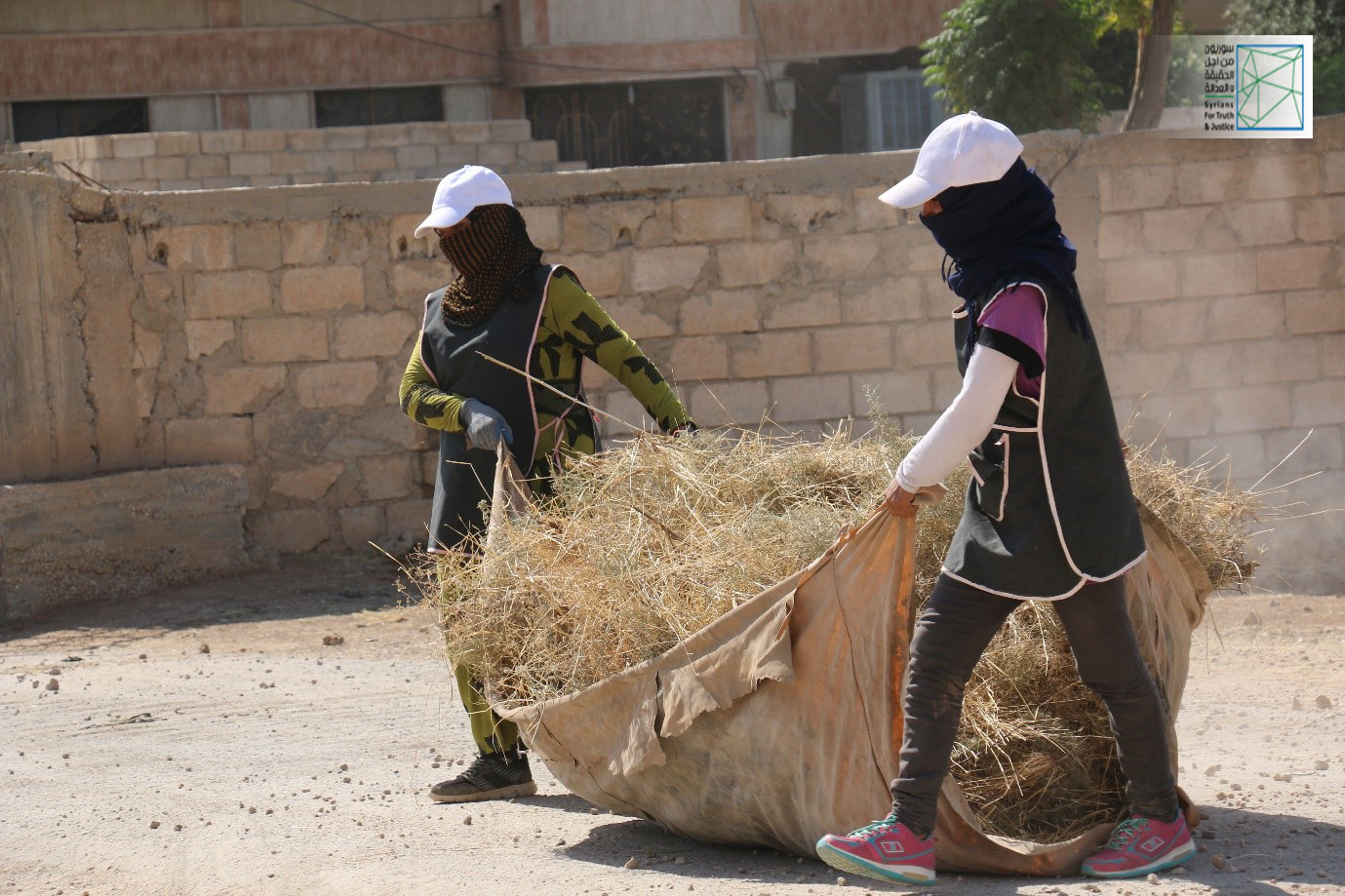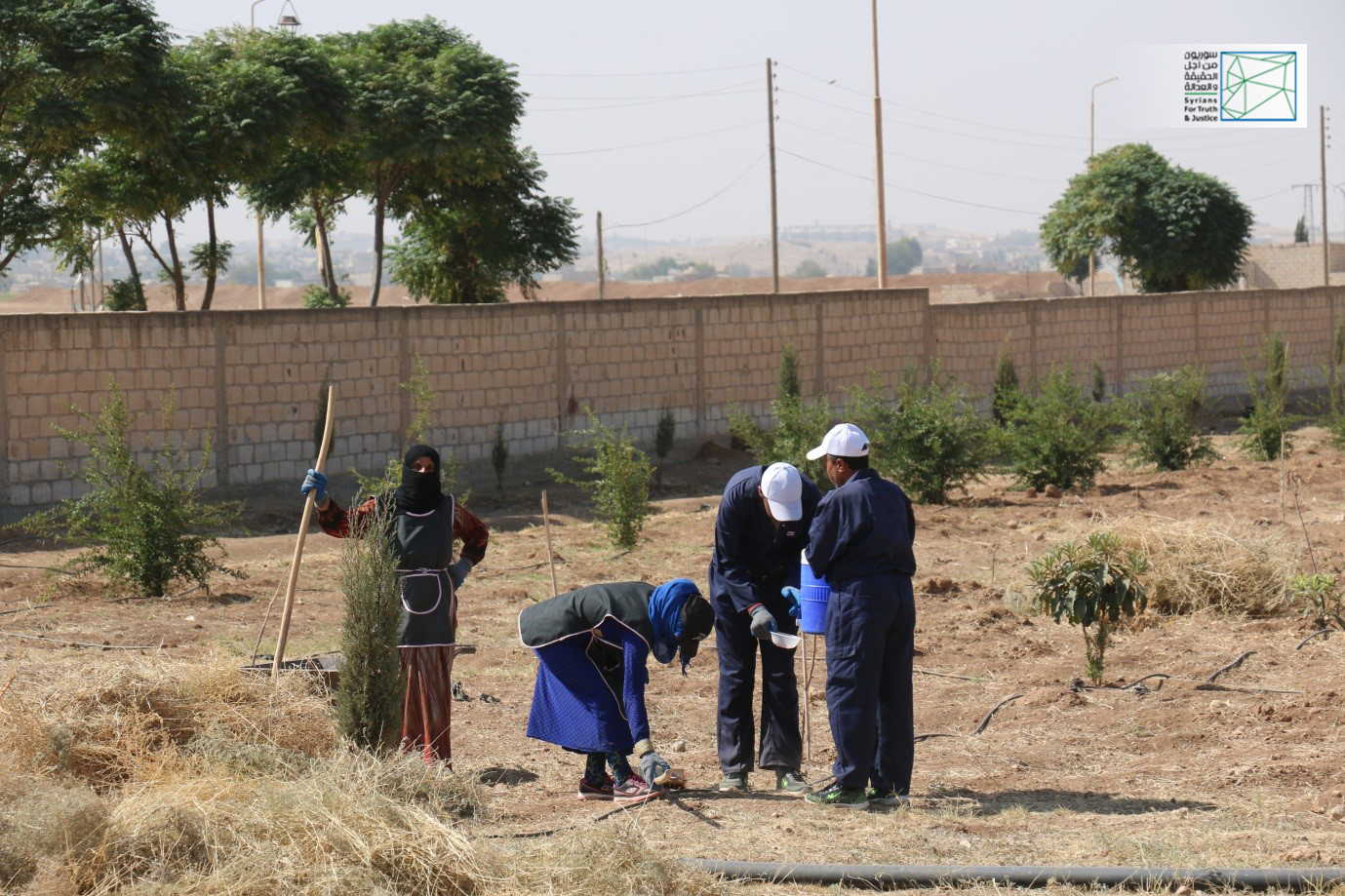While October the 15th, 2018, happens to be the International Day of Rural Women, the Syrian rural women do not have much to celebrate, as they continue to be marginalized, ignorant of their rights and coerced to make a living in a poor working environment for fewer wages than those granted to their male counterparts; in this environment, they are offered protection neither from harassment nor many other intimidations, such as the never-ending threat of dismissal.
On Rural Women’s Day, Syrians for Truth and Justice/STJ monitored a few aspects of the conditions encompassing the working environments of rural women and conducted interviews with a number of women in the two provinces of al-Hasakah and Idlib.
• Sexual Harassment and Threats of Dismissal:
In the al-Hasakah province, controlled by the Autonomous Administration, STJ’s field researcher monitored several cases of harassment which targeted working rural women, both verbally and physically, however, at a lesser degree, where a few men harassed the women working with them in the same field, making abusive comments in a humorous or joking manner. Of the cases monitored, is the incident that recently took place in the village of al-Safeh to the south of Ras al-Ayn/Sari Kani. There, the verbal harassment, which one of the young women, harvesting cotton for a daily payment, was subjected to from the Shawish/Workers Officer, both men and women, developed into physical assault. On October 12, 2018, the young woman’s sister told STJ the following:
“I and my 20-year-old sister worked together in harvesting cotton at the village. My sister told me on numerous occasions that the Workers Officer was verbally harassing her and trying to endear himself to her. I told her not be preoccupied with him. But the matter developed, for, later on, my sister openly informed me that the Officer took advantage of being alone with her for a few minutes and touched her body and tried to rape her. However, she managed to prevent him and kept the incident to herself, so our parents would not know and the problem does not get worse. For this reason, my sister was forced to quit the job though we are in a dire need for [her] wage.”

Two rural women carrying a straw stalk to the allocated storage in the village of al-Aziziyah in the countryside of the city of Ras al-Ayn/Sari Kani, al-Hasakah province. Photo credit: STJ.
In the province of Idlib, controlled by armed opposition/anti-Syrian government groups, STJ’s field researcher also monitored several cases where working rural women were subject to harassment from landowners or their employers, where the majority of the cases turned into assaults. In most cases, women were forced to tolerate and ignore the matter, as well as to keep silent about it so they could keep the job being destitute and in need. Nonetheless, very few of the working rural women were courageous enough to report the harassment they were subjected to, for which they were dismissed from the workshop where they worked.
One of the working rural women, a 30-year-old widow and a mother of two, filed a harassment complaint to a court in the city of Saraqib, claiming that one of the men who worked with her has assaulted her physically several times on board of the work’s vehicle, which transports about 40 men and women together. In response to the suit filed against the employer and the worker, the first was imprisoned for 15 days and released after he pledged not to transport men and women on board of the same vehicle at the same time. The worker, nonetheless, was not held accountable nor dismissed for lacking proof or evidence to the woman’s claim, who was fired despite her urgent need for the job, STJ’s field researcher reported.
• Wage Disparity and Bearing Work’s Heavier Load:
In Idlib province, STJ’s field researcher said, most of working rural women get an equal payment to that of men, between 200 to 400 Syrian pounds per hour, but the tasks assigned to women workers are a lot more difficult and arduous compared to those demanded of men, especially on olive harvest seasons, where landowners prefer that women collect olive due to their quality services, given that harvesting olive takes many hours and massive effort. Men’s duties, on the other hand, are limited to carrying and transporting the harvested crop.
In al-Hasakah province, STJ’s field researcher said that women workers are paid less than their men counterparts. In agriculture-related works, men get a daily payment of 4 to 5 thousand Syrian pounds, while women get 3 or 4 thousand Syrian pounds only for the same tasks.
In the public sector, women and men are equally paid, if they happen to have the same position, taking into consideration that women are not allowed to take up all the positions given to men. For instance, women are denied leadership posts of field-related missions or jobs; they also are not allowed to take up works that are “not suited to their nature”, including difficult and arduous jobs.
• Rural Women are Ignorant and Deprived of Their Rights:
In this context, STJ interviewed several working rural women in the two provinces of Idlib and al-Hasakah, which showed that a massive number of rural women did not continue their elementary education, were forced into early marriages or work in agriculture, by a father, a brother or a husband. These working women are also ignorant of the rights they must have and are not informed of the international events mandated by the United Nations/UN to define these rights and protect them.
In an interview with Lila Suleiman, a 26-year-old woman from the al-Aziziyah village in Ras al-Ayn/Sari Kani, al-Hasakah province, she was surprised when STJ’s field researcher told her about the International Day of Rural Women, and said:
“I hear that women have rights that equalize them with men, but I do not know what these rights are, or how women can realize them. I am also aware that even if this is true, it does not exist in our tribal society. Here, a woman’s rights are those defined by her father and brothers, and her husband at a later stage. The woman who violates this is viewed as a source of shame for her spouse, family and tribe, due to which she must be killed as to wash off the stigma. Here I am, a mother of two; my father did not ask for my opinion when the family approved to give me in marriage years ago. Here, all that the young girls want might be the right to choosing their life partners freely and without restrictions.”
Ruqaya al-Tawil, a 41-year-old woman from the al-Aziziyah village in Ras al-Ayn/Sari Kani, al-Hasakah province, also was not aware of women’s rights, though she has achieved one of them. She narrated:
“I did not know it before that, just like men, women have rights. As a child, I used to believe that a woman is half of a man or each man makes two women, and this is because women are not allowed to contemplate an opinion in our tribal society. However, in the past a few years, we came to know and saw that a woman has rights, just like men, and she can demand her rights when she is deprived of them, through resorting to the House of Women, under the Autonomous Administration, ‘a center concerned with defending the rights of women.’ Despite this, women’s rights are still lacking in our societies, for the woman that practices or demands her right turns into an outcast within her family and tribe. Actually, I have personally resorted to law a while ago, as to prevent my husband from marrying another woman. The Judiciary Body has forced my husband to divorce the second wife and to write a pledge as not to repeat this again. This has the power to preserve a part of the women’s rights, for it is a woman’s right to have an education; it is also her right to choose her life partner herself without coercion from anyone.”

Lila Suleiman and Ruqaya at work in an agricultural land in the village of al-Aziziyah, rural al-Hasakah. Photo credit: STJ.
In Idlib province, Khadija al-Khalil, a 30-year-old married woman and a mother of four from rural Idlib, told STJ the following:
“I left school as a child and helped my family through working in agriculture. I never heard that there is a day of women’s rights or rural women. We never observed these rights; I was not aware they existed. Since childhood, I recognized that a woman’s only duty is to make her husband happy. And here I am, working in agricultural lands and during the harvest seasons to help my husband in managing the expenditures and so that my children can continue their education. My older son is 16-year-old, in the 10th grade, I work so that he does not work and abandon school.”
She added: “I was really surprised when I came to know that there is an international day for rural women. Our suffering is massive, and we never had someone to care for us, not once, especially since we live in the countryside!”

